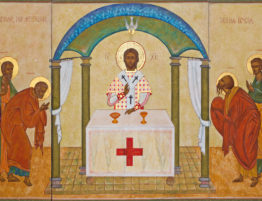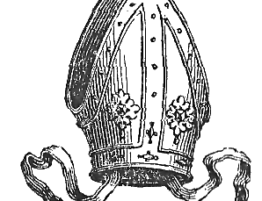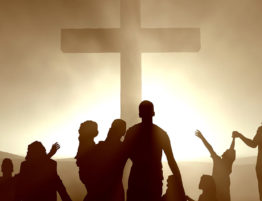
Text: John 15:26-16:4, 1 Peter 4:7
This past Thursday was the Feast of the Ascension of our Lord, which is always celebrated 40 days after Easter. The Ascension celebrates Christ rising bodily into heaven to return to his Father. But this event was far more than the Second Person of the Blessed Trinity returning from whence he came after fulfilling his rescue mission on earth. No, the Ascension was (as today’s Collect points out) the triumphant exaltation of the man Jesus the Messiah to be seated on the heavenly throne. This concept of the God-Man being enthroned at the right hand of the Father has a myriad of implications for our theology, Christology, and ecclesiology.
For example, we’re told in the Epistle to the Hebrews that when Jesus ascended, he completed his priestly work of sacrifice and atonement, as signified by being seated in heaven rather than standing before the altar. But we’re also told that he continues to intercede (that is, pray) for us, acting as our advocate before the Father.
We’re also told that Jesus’ enthronement as the conquering king is a fulfillment of the royal expectations King David prophecies in the Psalms, such as the opening lines of Psalm 110: “The Lord said unto my Lord, Sit thou on my right hand, until I make thine enemies thy footstool. The Lord shall send the rod of thy power out of Sion; be thou ruler, even in the midst among thine enemies.”
And then we have the implication pointed out by many of the Church Fathers, adapted by some of the best Ascension hymns, that in the exultation of the Man Jesus, we also have the exaltation of our own human nature. That is, since our Lord is forever incarnate, having forever united a true human nature to his pre-existent divine nature, he has also united us as his adopted brethren with the Divine. We, too, have become sons of God and have a share in his victory, exaltation, and inheritance. It is one of us, who has shared in our sufferings and temptations even to the point of death, that sitteth at the right hand of the Father.
Strangely, though, our collects, epistles, and gospels for the Ascension and the following Sunday don’t really focus on these lofty and exciting themes. While the collect for the Ascension itself uses a prayer for us to ascend with him in our hearts and minds as a hint of our exaltation because of Christ’s exaltation, the epistle and gospel really only give the bare facts of the event of the Ascension. And today’s collect and Gospel for the Sunday of Ascensiontide almost brush aside the Ascension itself, instead looking forward expectantly to next Sunday: Pentecost.
Indeed, the ancient name for the Sunday after the Ascension was “The Sunday of Expectation.” You see, just before our Lord ascended into heaven, he told his disciples to wait for the coming of the Holy Ghost and his empowerment after which they would be witnesses in Jerusalem and all Judea, on to Samaria, and the “uttermost part of the earth.”
Of course, this was not the first time Jesus had told the disciples to expect the coming of the Holy Spirit. In fact, in our Gospel reading from just two weeks ago, Jesus told them that his departure would be for their benefit because after he returned to the Father, he would send the “Comforter” or “Helper” (depending on your translation). Today’s Gospel is the section of Scripture that immediately precedes that text. Last week I mentioned that the last three Sundays were from John 16. Well, today’s Gospel is the end of John 15 and the first four verses of John 16. Though it was out of order, we’ve finally heard the whole chapter! As mentioned last week, the entire theme of John 16 (and the end of 15, as we will see) is expectation. Please turn in your bibles to John 15:26, also found on page 179 in your Prayer Book:
But when the Helper comes, whom I will send to you from the Father, the Spirit of truth, who proceeds from the Father, he will bear witness about me. And you also will bear witness, because you have been with me from the beginning.
Next week, when we celebrate the Feast of Pentecost, we’ll see that the disciples and our Lord’s mother spent the ten days after the Ascension waiting in prayer for the promised “Helper” (or “Comforter” in the King James). Before they could begin their mission of bearing witness to Christ, they needed empowerment by the Holy Spirit. The Holy Spirit is called in our Gospel, the “Spirit of Truth.” This speaks to the inspiration of the Apostolic witness we have in the Scriptures. That is, we recognized (as we say in the Creed) that the Holy Ghost “spake by the prophets” and by the Apostles. It is his voice we see in the words of the Prophets of the Old Testament and Apostles of the New. The Apostles weren’t making up a new religion. Rather, they were simply bearing witness to what they had seen and heard from Jesus, confirmed by the work of the Holy Spirit. You may recall in the Gospels how the Apostles rarely understood what Jesus was saying at the time he said it. But when the Holy Spirit came, he would turn the lightbulb on, as it were, and they would finally “get it.”
The thing about the bible is that it isn’t particularly difficult to intellectually understand if we are willing to put for the time and effort to really study it. Yes, it’s a large collection of texts. Yes, it’s includes several different genres of writing. But it isn’t any more complex than any other major work of ancient literature, and we’ve got the benefit of study bibles and introductory commentaries that make the job even easier. But to really grasp the spiritual truths of Scripture takes a work of the Holy Ghost. God the Spirit must bear witness to our souls if we are to really see the Scriptures as the word of God. We call this the doctrine of illumination, and it basically says that we are all spiritual morons without the Holy Spirit’s divine intervention.
Expectation Sunday reminds us of this fact. It reminds us that we need to pray for the Holy Spirit to work through the Word and Sacraments if we are to be disciples of our Lord. Indeed, this is what the Apostles, the Blessed Virgin Mary, and the other followers of Christ were doing between the Ascension and Pentecost: praying and waiting on the Holy Spirit.
This expectant prayer continues for us today. At the beginning our Epistle St Peter writes: “The end of all things is at hand; therefore be self-controlled and sober-minded for the sake of your prayers” (1 Peter 4:7). The phrase “sober-minded for the sake of your prayers” in the ESV is rendered “watch unto prayer” in the King James. The idea the text is conveying is that by being clear-headed and sober-minded, we would be like a soldier who is vigilant and watchful rather than drunk and distracted. Why and to what end? For the sake of our prayers. Expectant, vigilant prayer is needed as we await the fulfilment of our mission, when the Lord finally returns and fully establishes his kingdom “on earth as it is in heaven.”
Back in our Gospel text, Jesus goes on to tell us what else to expect when the Holy Spirit comes and we get about the business of mission. Verse 1 of John 16:
I have said all these things to you to keep you from falling away. They will put you out of the synagogues. Indeed, the hour is coming when whoever kills you will think he is offering service to God. And they will do these things because they have not known the Father, nor me. But I have said these things to you, that when their hour comes you may remember that I told them to you.
Even when empowered by the Holy Spirit, the Christian life can be hard. The world, the flesh, and the devil will oppose you. Christian witness shines the light of the truth on their lies. You will, at times, be tempted to fall or drift away. There will be times when the world seems more attractive than the Church. There will be times when you will be hated for Christ’s sake. Indeed, we’re beginning to see that in some parts of our American culture today, especially when it comes to issues of sexual ethics and morality. Because of what the bible says on these issues, Christians who follow biblical and historic Christianity are often viewed not merely as wrong or backwards, but actually evil, on the same level as a racist. And there are certainly other parts of the world where people think it is their duty, service, and even worship to God to persecute and even murder Christians, as Jesus said.
But notice that Jesus told us why he said this: so that we would not fall away. Jesus said this would happen; it’s certainly not pleasant, but it’s not a surprise. This is where the Holy Spirit’s work as Comforter or Helper comes into play. He reminds us of the goodness and worthiness of the truth. He reminds us that Jesus is preparing a place for us in his Father’s house. He reminds us that Jesus’ sufferings led to exaltation and that ours is simply the same path our Master trod.
St. John Chrysostom writes:
Let us too consider these things in our temptations, when we suffer anything from wicked men, “looking to the Beginner and Finisher of our faith” (Heb. xii. 2), and considering that it is by wicked men, and that it is for virtue’s sake, and for His sake. For if we reflect on these things, all will be most easy and tolerable. Since if one suffering for those he loves is even proud of it, what feeling of things dreadful will he have who suffers for the sake of God? For if He, for our sake, calleth that shameful thing, the Cross, “glory,” much more ought we to be thus disposed. And if we can so despise sufferings, much more shall we be able to despise riches, and covetousness. We ought then, when about to endure anything unpleasant, to think not of the toils but of the crowns; for as merchants take into account not the seas only, but also the profits, so ought we to reckon on heaven and confidence towards God.
As St. John Chrysostom points out, not only does this give us the comfort and help necessary to withstand suffering, it also gives us the help and comfort necessary to resist temptation. The cross, that most shameful method of execution, is transformed into a symbol of glory. We began today’s service with Eleanor’s baptism. Remember what we said when she received the sign of the cross.
We receive this Child into the congregation of Christ’s flock; and do sign her with the sign of the Cross, in token that hereafter she shall not be ashamed to confess the faith of Christ crucified, and manfully to fight under his banner, against sin, the world, and the devil; and to continue Christ’s faithful soldier and servant unto her life’s end. Amen.
The cross is a call to battle and to service. We battle against sin, the world, and the devil. We serve as Christ’s soldier. But we don’t fight alone. Jesus never leaves us alone. Remember, as we conclude the baptism, we pray over everyone present:
The Almighty God, the Father of our Lord Jesus Christ, of whom the whole family in heaven and earth is named; Grant you to be strengthened with might by his Spirit in the inner man; that, Christ dwelling in your hearts by faith, ye may be filled with all fullness of God. Amen.
By the Holy Spirit, who Scripture calls both the Spirit of the Father and the Spirit of Jesus, Christ dwells in us, we are strengthened, and we see the fruits of our expectation. As we prayed in our collect, Christ has not left us comfortless, but has sent his Holy Spirit both to comfort us and to “exalt us unto the same place whither our Saviour Christ is gone before.”
In the Name of the Father and of the Son and of the Holy Ghost. Amen.




